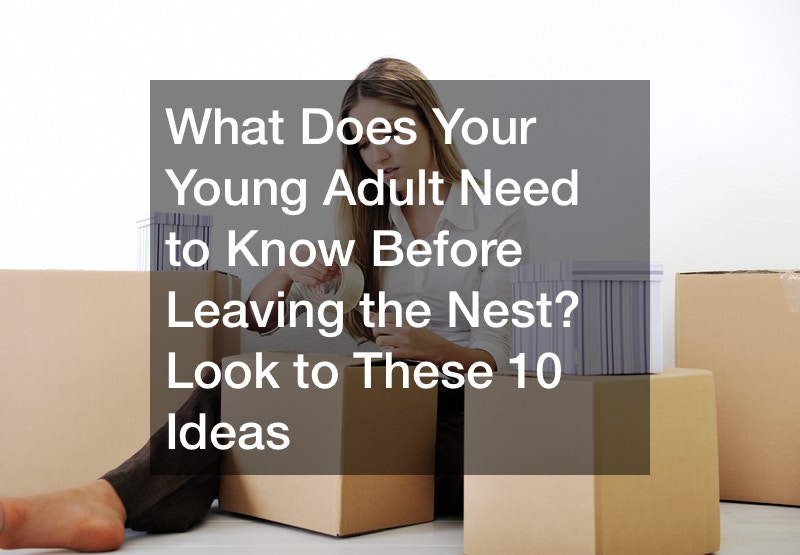What Does Your Young Adult Need to Know Before Leaving the Nest? Look to These 10 Ideas


According to Pew Research, “The coronavirus outbreak has pushed millions of Americans, especially young adults, to move in with family members.” In July 2020, the percentage of young adults living with their parents rose as high as 52%. Living with parents helps ease economic burdens.
However, there are steps parents and young adults can take to reverse this trend. Young adults can gain more autonomy with just a little bit of help. Verywell Family recommends collecting at least some rent from your child while he or she is living home and putting that monthly rent into a savings account. When young adults get ready to move out on their own, you can use this savings toward a security deposit on an apartment.
Another important step is communicating openly. Talk to your young adult child about any misgivings, reservations, or fears they might have. If they feel nervous about living with a roommate or with roommates, sharing some of your own experiences may help. Ask them if they have any questions about the practicalities of living on their own, and do your best to answer them in detail.
That leads us to our final suggestion: start encouraging and reinforcing independent behaviors while your adult child is still living at home. Do not just educate your child about creating a budget and preparing meals, give them plenty of opportunities to do it.
Here are 10 essential skills young adults need to learn — and learn well — before moving out.
1. Laundry

Strangely enough, there are a shocking number of young adults and even not-so-young adults who do not know how to properly do their own laundry. Now is the best time to learn!
To help young adults master the skill of doing their own laundry, pass along these tips.
First, learn how to sort clothes. Sort clothes into light and dark piles. Pick out heavy fabrics and light fabrics, and wash them separately. Secondly, treat stains. Treat stains right away using detergent, mild dish soap, or an on-the-go detergent pen. Leaving them to sit or scrubbing stains will make them worse. Next, learn how to use an appropriate detergent. If you have a top-loading washer, pour the detergent in first. That will distribute the detergent evenly and more effectively launder your clothes. There are detergents for colors, detergents for whites, and detergents for sensitive skin. Finally, choose the right settings. When in doubt, use the permanent press cycle and wash clothes in cold water. Use the delicate cycle for thin fabrics, sweat-wicking clothing, or clothes with frills and embellishments.
Of course, doing laundry is not without its challenges. Learn some of the most likely things to come up and how to avoid them. For best results, beware of new clothes and towels, especially dark ones. If you are not careful new, dark clothing items may bleed onto your clothes. Martha Stewart Living suggests you “dampen a discreet spot, then blot it with a white cloth to see if the dye bleeds. If so, wash the item on its own until the color stops running.”
Also, be sure to turn clothes inside out. If you notice pilling and excessive wear on your clothes, the problem may be how you’re washing them. Velcro, buttons, and rough fabrics can rub up against your clothes, causing them to pill or wear more easily. Turn items inside out to prevent obvious pilling. This is especially important for nice sweaters and delicate items, like dress shirts and blouses. Additionally, always empty pants and shirt pockets. We have all done it before. In a pinch or a hurry, you may forget to empty the items out of your pockets and inevitably end up picking small bits of paper out of the wash. Always, always empty pockets, even if you are washing one or two items by themselves for a particular meeting or occasion.
Finally, think twice about using mothballs. Mothballs may get the job done, but they are often toxic — and they smell. If you are struggling to control clothes moths, choose items with synthetic fibers or talk to a local pest control professional about mothball alternatives.
Before moving out, you need to know how to do your own laundry, and knowing the specifics help.
2. Budgeting
One of the most critical skills you can teach your teenager or young adult before moving out is budgeting.
First, use whatever you can as a learning opportunity. If you are replacing your rooftop, talk to your child about creating a budget before calling to get an estimate from the roofing company. To come up with accurate figures, get an inspection and price the materials. Walk through the process step-by-step with your adult child following along with you.
Taking advantage of all opportunities to teach budgeting. Even budgeting for specific projects will help your child pick up the basic skills it requires.
At a minimum, before moving out, teach your child the basic steps to make a budget. These include determining their monthly income, drafting a list of consistent monthly expenses, compiling a list of variable expenses, and making adjustments as necessary. For example, tally up the total monthly amount spent on rent, groceries, utilities, gasoline, and any other regular bills. If they still have money left over, they can allot funds for extras, like new clothes, eating out at restaurants, and attending events. If at all possible, young adults should set aside a regular portion of their budget for savings.
The Balance recommends the 50-30-20 budget. Using that model, teach young adults to budget 50% for necessities, 30% for extras and variable expenses, and 20% for savings.
3. Grocery Shopping

There are errands that you will do often and errands you will do significantly less often. Over the years, you may find yourself in a flower shop to purchase flowers for romantic partners, holidays, thank-yous, and funerals. It is important to feel comfortable doing so, but it is not likely to come up on a daily — or even weekly — basis. That, however, is not the case for grocery shopping.
Grocery shopping is something all of us will do over and over again, often at least once a week. Before moving out, teach young adults to shop for the essentials.
Teach them to stock the essentials, like rice, grains, bread, milk, protein, fruits, vegetables, coffee, and tea. Teach them to make an inaugural trip for some of the basics, including non-perishables, like grains, spices, baking staples, canned foods, and frozen foods. Then teach them what foods they will be shopping for week after week, foods like bread, milk, meats, fruits, and vegetables.
Make sure to tie this in with lessons on budgeting. Encourage young adults to make a grocery list and properly store foods so they last.
4. Meal Preparation
Grocery shopping on its own is not enough. If you want your young adult to continue eating healthy, one of the best ways to ensure they do that is to teach them about cooking — and, better yet, meal preparation. Meal preparation is an essential skill to learn before moving out as it takes cooking and makes it as practical and convenient as possible.
Looking for some meal prepping tips? First, invest in single-portion storage containers. Find meal prep containers that are best suited for your purposes. Your young adult may prefer long, single-portion meal prep containers, containers with dividers or compartments, or different-sized containers to separate entrees from snacks and side dishes. Secondly, make a meal plan and turn it into a grocery list. Come up with a meal plan (or find one online).
Often, it is best to choose meals with the same protein, like beans or chicken, to make meal prepping easier. Then, designate a day and time to meal prep. Start by chopping all fruits and vegetables you will use that week. If you use rice, chicken, or any other ingredient in multiple dishes, you can prepare that ahead as well. Finally, put meals together. Refrigerate meals you plan to eat soon, and freeze any remaining meals. Once you have all the basic elements laid out in front of you, use the ingredients to make your individual meals. Portion meals out into containers, and refrigerator or freeze them.
Make sure your adult child practices meal prepping with you before moving out. It is a skill they can use to grab something quick and healthy for dinner every night of the week, or one they can use to save money by taking their lunch to work.
5. Proper Organization

Before moving out, your young adult needs a basic understanding of organization. Throwing everything onto the floor — or even haphazardly into a set of drawers — is only going to make their lives harder.
Teach them to separate clothes. Suggest a drawer for shirts, a drawer for pants, and a drawer for underwear and socks. If they want to get even more organized, they can divide up their drawers into subsections. A sock drawer may include a portion for white socks, a portion for color socks, and a portion for animal print socks.
Suggest they hang up formal or business casual clothes for work and special occasions.
6. Making Appointments
If you are still making appointments for your young adult’s dental care for them, stop. Before moving out, they need to know how to go online or call to make appointments, and they need to be comfortable doing so.
Whether you are booking an appointment for cryo therapy or a doctor’s appointment, show them how to call. Then, when your young adult is scheduling a routine dental cleaning or physical therapy appointment for a sports-related injury, they can do it on their own with your guidance. You will not be there to do it for them while they are in college or while they are going to work every day. It is best for them to learn how to do this now, before moving out and without relying on you.
7. Gathering And Understanding Insurance Information

Making an appointment online or over-the-phone is relatively simple. For many young adults, it is something they must learn to get comfortable with — not something that is particularly difficult to do. Unfortunately, the same is not necessarily true for health insurance and dental insurance.
Whether your child wishes to schedule a routine checkup with their local health clinic or look into the cost of Invisalign for adults, knowing what insurance covers, what insurance does not cover, and how to look it up will make all the difference. If your adult child is still under your health insurance plan, make sure they have the necessary login information to access your account. Walk them through the basics of looking up covered services. Many insurers include a .pdf or file showing the co-pay and costs of basic services. These services may include a doctor’s visit, a visit to an in-network special, or an annual eye exam.
Teach young adults how to look up what providers are in-network, and teach them how to search key terms to look up pricing for less popular services. Make sure your young adult knows that finding out whether some services are covered or why services cost more than they initially thought will require a direct phone call to the insurance company.
8. Cleaning And Cleaning Products
Before moving out, make sure your young adult has a basic understanding of cleaning. While they may be able to get by with all-purpose cleaners for most kitchen and bathroom surfaces, it is important for them to know when “catch-all” methods do not work.
For example, if they will be moving into an apartment with hardwood flooring, teach them how to properly clean it. They must use a mild soap or wood-safe cleaner. Avoid oils and harsh chemicals. The first will leave a greasy residue on the floor, while the latter will remove the floor’s finish over time. Use microfiber mops or soft mops to avoid scuffs and scratches.
9. Car Care

Before moving out, your young adult should know how to fill up their gas tank, get an oil change, and how to check their tire pressure. Knowing how to pump gas will ensure that they are not stranded on the side of the road. Learning how to change the oil or get an oil change and how to check the tire pressure will help them maintain their vehicle and keep them safe.
Teach your young adult to set and use the car alarm system. Just like it is important to protect homes with secure protection systems, making use of the car alarm can be wildly helpful, particularly in large cities.
10. Securing And Maintaining Employment
The final skill your young adult needs to know before moving out is how to get a job and keep it. Teach them how to find a job online, in-person, or by networking. Help them put together a professional resume and teach them good habits, like being on time and having a good work ethic.
Before moving out, your young adult needs to master critical life skills. For a good foundation, start with the ones above.







